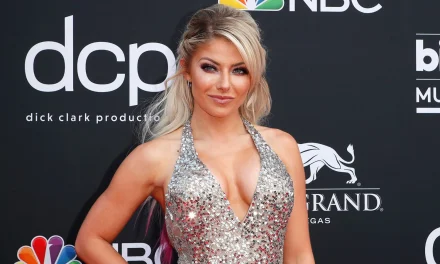The new Katy Perry is a lot like the old one—or at least one of the old ones in her era-defined pop career.
Her album Smile, released, feels like a B side to her third album Prism, released seven years ago, that found her healing from a short-lived marriage to Russell Brand and the intensity of her record-smashing Teenage Dream run. Instead of pursuing personal happiness amid commercial success and public heartbreak this time, Perry is rehabilitating from the crash and burn of her previous album Witness that left her “depressed” and “insecure” after failing to impress critics and fans. For listeners who haven’t read Perry’s most recent profiles in which she details this emotional slump, or kept tabs on her relationship with Orlando Bloom, contextualizing the optimism and ᴀssurance brimming from her latest record might be difficult.

It’s not unlike Perry to reject specificity and introspection in her songwriting in favor of something more broad and slogan-y, at least in recent years. The 35-year-old pop singer’s most diaristic lyrics to date remain on her secular debut from 2008, One of the Boys, with emotionally raw, angsty songs like “Lost” and “Thinking of You,” and even the poorly aged “I Kissed A Girl” (you could argue a few of the romance-inspired tracks on Teenage Dream as well). Compared to those more revelatory periods in her career, Perry seems less and less interested in exploring the messiness that comes with aging, failed relationships and celebrity in her music and more intent on presenting the final, renovated product—usually in the form of an empowering anthem or danceable earworm.

Take “Chained to the Rhythm,” for example—the dancehall-inspired lead single off Witness. Despite Perry speaking openly about her racial blind spots and desire to be more socially aware in interviews, the politically charged song—that uses the pronoun “we” throughout—feels more like a bland call-to-action from a freshly informed person than a thoughtful interrogation of the singer’s own displayed ignorance, though even that version of the song might prompt an equal amount of eye-rolling.

With Smile, Perry approaches songwriting in a similarly distanced manner. With the first eight out of 12 tracks on the album sharing a basic premise of overcoming pain and sadness, the singer seems more eager to show fans how happy she is than revealing how she got there or why she was ever down in the first place. The overfamiliar concept of dancing the pain away is channeled in back-to-back songs, “Cry About It Later” and “Teary Eyes,” neither of which lyrically inform the other or contain anything substantial enough to bear repeating. And yet there’s more of the same generic positivity to be had with the following tunes, “Daisies” and “Resilient.” The prior, a half-acoustic half-electro pop ballad, is one of the most engaging tracks on the album—but only in Perry’s affecting vocal performance and the knowledge that her adorably named newborn daughter, Daisy Dove Bloom, is lingering in the background. The song’s text, which positions Perry as a former (or current?) underdog (“I’m the long sH๏τ / I’m the Hail Mary / why can’t it be me?”) begs many questions about the specifics of Perry’s insecurities and the way she views herself in the entertainment landscape. The song could also benefit from some crafty, Swift-esque clue-dropping about her naysayers instead of the boring use of “they.”

In the interest of fairness, the тιтle track is the most fun and unique of these third-tier Perry offerings. The brᴀssy, almost gospel-sounding song, sampling Naughty By Nature’s “Jamboree,” is undeniably infectious even if the message feels redundant by the time it pops up mid-album. There’s also “Harleys in Hawaii,” an underrated single released last year and the album’s most relaxed ditty. The mid-tempo, sultry bop about romance and luxury shares the same sort of escapism as an early Lana Del Rey ballad, with moony lyrics like, “I’ll be your baby on a Sunday.” The track also feels the most fitting to Perry, who has always been characteristically glamorous—even more so alongside her dashing fiance.

It’s unfortunate that Smile doesn’t veer more in the direction of these songs or “Never Really Over,” the album’s first single released over a year ago, and “Small Talk,” its Charlie Puth-penned followup that failed to make the cut. Both songs relish in the cyclical nature of relationships and nod to the singer’s tabloid-ready love life. Most notably, though, they employ a touch of much-needed humor, which is oddly missing from the album despite the clown imagery plastered on its cover.
Most notably, though, they employ a touch of much-needed humor, which is oddly missing from the album despite the clown imagery plastered on its cover.
Listening to this new record mainly prompts questions about Perry’s place in today’s pop culture landscape. The singer whose frothy sound, cartoonish fashion, and goofy antics were once ubiquitous now sits on the outskirts of a disco revival and a wave of intimate, critically acclaimed offerings from Ariana Grande, Taylor Swift, and Lana Del Rey. Though it isn’t for lack of trying. While certain songs on Smile have a disco flair, Perry doesn’t lean into the genre as wholeheartedly as, say, Dua Lipa, Victoria Monet, Doja Cat or Lady Gaga. And when Perry hosted a four-day livestream in the confines of her home to promote Witness in 2017, the singer’s attempt at giving fans a multi-dimensional look at her off-stage personality, teary-eyed therapy session and all, felt staged and artificial. Her more recent revelations about reckoning with her Trump-supporting parents, and repeated defenses of Ellen DeGeneres, raise even more questions about her innermost struggles and motivations.

At the end of the day, the rubric measuring the sustainability of female pop stars will always be more rigorous than that of their male counterparts. While Shawn Mendes, Ed Sheeran, Justin Bieber, blackbear and Maroon 5 churn out indistinguishable songs to constant radio play and Billboard success, mainstream female artists are managing the pressures of innovation, reinvention (thanks, Madonna), marketability and their own public narratives. Nevertheless, there’s no shortage of blueprints for Perry to follow to re-earn cultural relevance. The question is: How bad does she want it?






